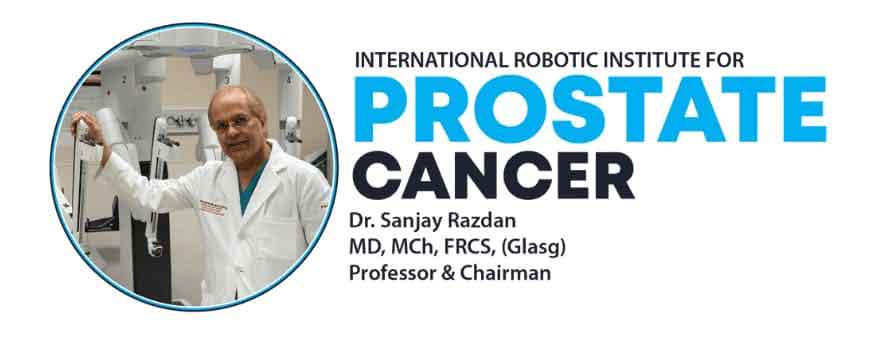Prostate cancer might feel like a life-altering diagnosis, but choosing the right surgeon can make a world of difference. Finding a skilled and experienced surgeon is crucial, whether you are exploring robot-assisted surgery, minimally invasive procedures, or traditional methods. Dr. Sanjay Razdan is a renowned prostate cancer surgeon serving patients from St. Petersburg, Florida with quality medical care and treatment procedures.
If you are looking for a specialist prostate cancer surgeon, Dr. Razdan is your top choice! With over 20 years of experience, he has performed over 10,000 surgeries successfully and has expertise in robot-assisted surgeries.
St. Petersburg is home to numerous skilled prostate cancer surgeons, such as Dr. Razdan, who specializes in robotic surgeries with a minimally invasive and patient-centred approach for optimal results and better recovery. If you are seeking an expert prostate cancer surgeon to diagnose prostate cancer, book an appointment with Dr. Razdan by contacting his team.
Prostate Cancer Treatment serving patients from St. Petersburg, Florida

da Vinci Robotic Prostatectomy: A Minimally Invasive Surgical Procedure serving patients from St. Petersburg, Florida
When facing a diagnosis of prostate cancer, it is important to learn about all treatments and surgical options.
 Open Surgical Incision
Open Surgical Incision da Vinci Robotic Incision
da Vinci Robotic Incision“Urinary control and erections with the da Vinci Robotic Prostate Surgery are MUCH BETTER than with conventional Laparoscopic radical prostate surgery (laprp)”
If your doctor recommends surgery to treat your prostate cancer, you may be a candidate for a new, less-invasive surgical procedure called da Vinci Robotic Prostatectomy. This Robotic Prostatectomy procedure incorporates a state-of-the-art surgical system that helps your surgeon see vital anatomical structures more clearly and to perform a more precise surgical procedure.
For most patients, da Vinci Robotic Prostatectomy Surgery performed by Dr. Razdan offers numerous potential benefits over
open prostatectomy including:
- Shorter hospital stay
- Minimal pain
- Less risk of infection
- No blood transfusions
- Less scarring
- Faster recovery
- Quicker return to normal activities
- Excellent Urinary Control
- Excellent Erections
PROSTATECTOMY (SURGERY)
A surgical approach to treating prostate cancer will remove all or part of the prostate. Typically, men with early-stage disease or cancer that’s confined to the prostate will undergo radical prostatectomy—removal of the entire prostate gland, plus some surrounding tissue. Other surgical procedures may be performed on men with advanced or recurrent disease.
In the most common type of prostatectomy—radical retropubic prostatectomy—an incision is made in the abdomen and the prostate is removed from behind the pubic bone. The surgeon then stitches the urethra directly to the bladder so urine is able to flow. Because it typically takes a few days for the body to get used to this new setup, the surgeon will insert a catheter, or tube, into the bladder. Urine will flow automatically out of the bladder, down the urethra, and into a collection bag without the need for conscious control of the sphincter. The catheter is usually kept in place for about a week to 10 days.
Another type of surgery, known as radical perineal prostatectomy, is performed less frequently these days. In this procedure, the surgeon makes the incision in the perineum (the space between the scrotum and the anus) and the prostate is removed from behind.
Surgical Techniques
Nerve-Sparing
In a nerve-sparing prostatectomy, the surgeon cuts to the very edges of the prostate, taking care to spare the erectile nerves that run alongside the prostate. If the nerves cannot be spared because the cancer extends beyond the prostate, it might be possible to surgically attach, or graft, nerves from other parts of the body to the ends of the cut erectile nerves.
Surgeons won’t know until the time of the procedure if nerve-sparing is possible; it depends on whether the cancer is invading the nerves. However, the nerve-sparing procedure offers the best chance to preserve long-term erectile function.
Laparoscopic
In laparoscopic surgery, very small incisions are made in the abdomen. The surgeon then inserts narrow instruments fitted with cameras and/or surgical tools, allowing him or her to visualize and operate on the internal structures without cutting open the entire abdomen.
With a robotic interface, the surgeon maneuvers a robot’s arms, which in turn control the cameras and instruments. Robotic surgery has become very popular over the past 10 years due to the smaller incision and shorter post-operative recovery period.
To date, open and laparoscopic procedures have never been compared head-to-head in terms of cancer control and side effects. In general, in the hands of a skilled surgeon, these outcomes are optimized with either approach.
The Importance of Surgical Skill
THE SINGLE MOST IMPORTANT FACTOR IN DETERMINING OUTCOMES IS SURGEON EXPERIENCE
Prostatectomy, like many surgical procedures, is very delicate work, and the difference between a good surgeon and a great surgeon can affect outcomes.
When choosing a surgeon, at a minimum, ensure that he or she is someone in whom you have confidence and trust, and someone who has enough experience to not only perform the operation, but also to make an informed clinical judgment and change course if necessary. Hundreds of patients have traveled down to Miami from St.Petersburg to be treated by Dr. Razdan, considered by many to be the best Prostate Cancer Surgeon in the state of Florida. Dr. Razdan has performed over 10,000 robotic procedures in Urology making him one of the best in the world.
If you have been diagnosed with Prostate Cancer and are located in St. Petersburg, contact Dr. Razdan now.
Risk Factors & Symptoms of Prostate Cancer
Some of the common risk factors for prostate cancer include age, family history, ethnicity, obesity, and smoking. Some common and potential symptoms of prostate cancer include
Common Symptoms:
- Urinary Problems
- Difficulty starting urination or emptying the bladder completely
- Weak or interrupted urine flow
- Frequent urination, especially at night
- Pain or burning during urination
Other Potential Symptoms:
- Blood in the urine
- Pain in the back, hips, or pelvis
- Painful ejaculation
- Erectile dysfunction
Dr. Sanjay Razdan | The Leading Prostate Cancer Surgeon Serving Patients From St. Petersburg, Florida
Dr. Razdan is a world-renowned surgeon and the chairman and professor of the International Robotic Institute for Prostate Cancer, a globally recognized facility. He is also the former director of the Urology Center of Excellence and the chairman of the Department of Surgery at Jackson South Hospital in Miami. Dr. Razdan is a highly skilled prostate cancer surgeon helping patients from St. Petersburg, Florida with top-tier medical care and treatment plans.
Dr. Razdan provides numerous treatment procedures, such as robotic prostatectomy, amniotic membrane, salvage prostatectomy, MULP, Aquablation Robotic, robotic inguinal hernia repair, urinary symptoms and treatment, a penile implant for erectile dysfunction, kidney stone removal, MRI Ultrasound Prostate Fusion Biopsy, HIFU, bladder cancer treatment, and TURP.
He has completed his medical degree at UM/Jackson and went to an advanced fellowship in endourology and minimally invasive urologic oncology, which includes the da Vinci robotic surgical system, at Thomas Jefferson University Hospital in Philadelphia. He is one of the top urologists in South Florida to perform state-of-the-art robotic prostate surgery. Dr. Razdan is also the director of the Comprehensive Kidney Stone Center, which provides treatment solutions for kidney stone disease.
Advanced Robotic Prostate Surgery
Robot-assisted prostatectomy is a minimally invasive treatment procedure used to remove the prostate gland in patients diagnosed with prostate cancer. The robotic system is used for surgery, resulting in greater precision and quicker recovery times.
- Minimally Invasive
- Greater Precision
- Faster Recovery
- Reduced Blood Loss
- Lower Risk of Complications
- Better Urinary and Sexual Function
Why Choose Dr. Razdan for Prostate Cancer Treatment?
Dr. Razdan is one of the leading prostate cancer surgeons who specializes in treating prostate cancer, based in Doral, FL. He and his medical professionals are equipped with cutting-edge techniques, providing minimally invasive and patient-centred treatment for optimal results and better recovery. When it comes to prostate cancer surgery, choosing a reliable and experienced surgeon is important. Here are some reasons why Dr. Razdan is the best choice for patients in St. Petersburg:
- Extensive Experience & Expertise: Dr. Razdan has performed many robotic prostate surgeries and has years of experience in treating challenging prostate cancer surgeries.
- Cutting-Edge Technology: With advanced facilities and the latest techniques, Dr. Razdan provides patients with highly effective and minimally invasive treatment procedures.
- Personalized Treatment Plans: He provides personalized treatment plans according to each patient’s unique needs and post-operative medical care to ensure faster and better recovery.
- Post-Operative Medical Care: Dr. Razdan also provides customized post-operative medical support, including rehabilitation plans and follow-ups for better & faster recovery and enhanced quality of life.
Schedule a Consultation with Dr. Razdan!
If you also have prostate cancer and require a permanent solution, Dr. Razdan is here to assist you! Schedule a consultation with Dr. Razdan today by contacting his team through the given details:
Dr. Sanjay Razdan, MD, MCh, FRCS (Glasg)
Phone No: 1-305-251-8650, 1-305-251-8913
Office Hours: Monday – Friday, 8:30 AM to 5 PM. Closed on weekends
Address: International Robotic Institute for Prostate Cancer 3650 N.W. 82nd Avenue Suite PH 501, Doral, FL 33166
Frequently Asked Questions About Prostate Cancer Surgeon St. Petersburg, Florida.
Question 1. How long does recovery take after prostate cancer surgery?
Answer. Recovery after prostate cancer surgery typically takes around 4 to 6 weeks to return to daily life activities.
Question 2. Why should I choose robotic prostate surgery over traditional surgery?
Answer. Robotic surgery has several key advantages, such as smaller incisions, reduced blood loss, faster recovery, shorter hospital stays, better preservation of nerves, reduced risk of incontinence & erectile dysfunction, and greater precision.
Question 3. Will I need additional treatment after prostate surgery?
Answer. In some cases, patients may need additional treatments, such as radiation therapy, especially if cancer cells are found beyond the prostate.
Question 4. What are the risks of prostate cancer surgery?
Answer. Prostate cancer surgery carries several risks, such as urinary incontinence, erectile dysfunction, and bleeding.







